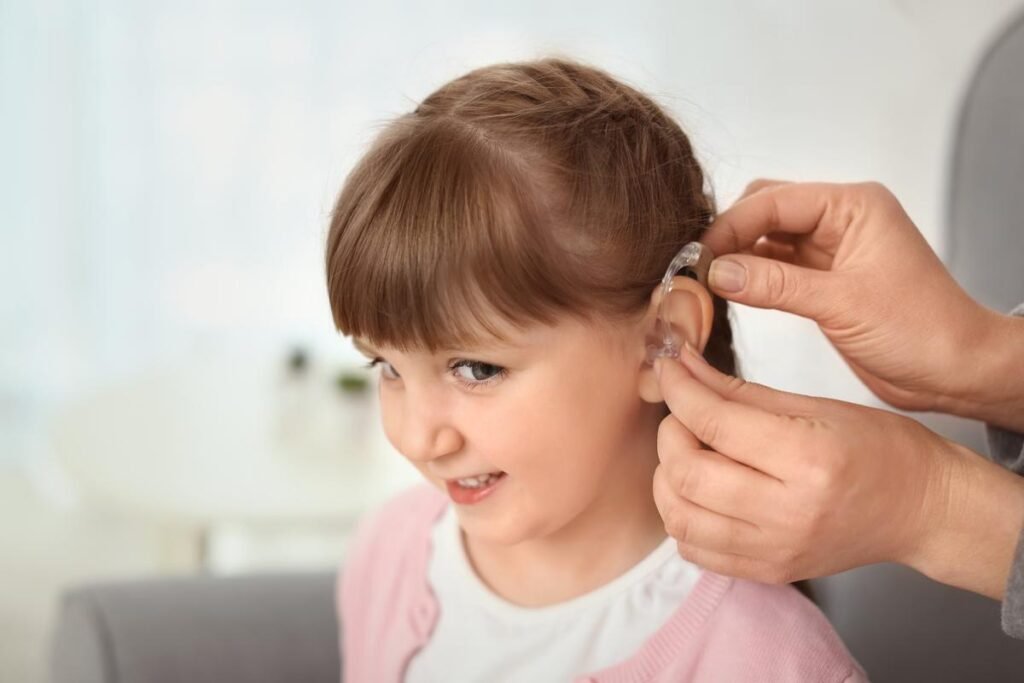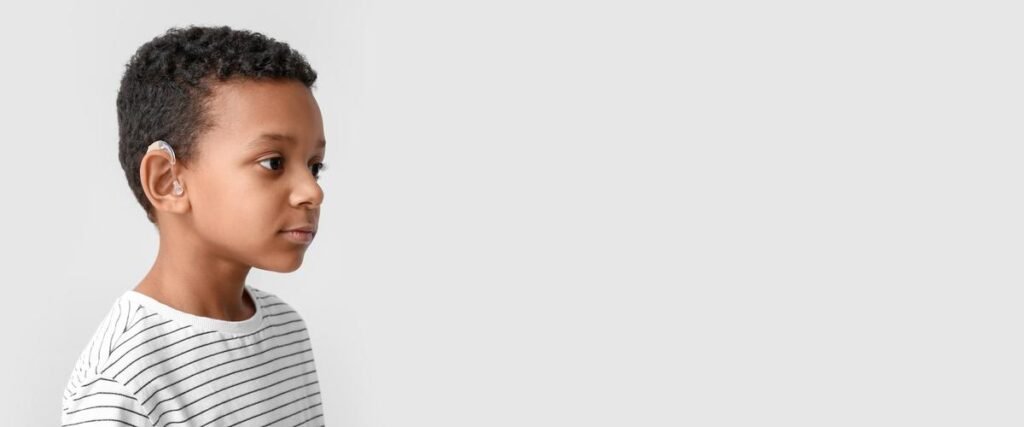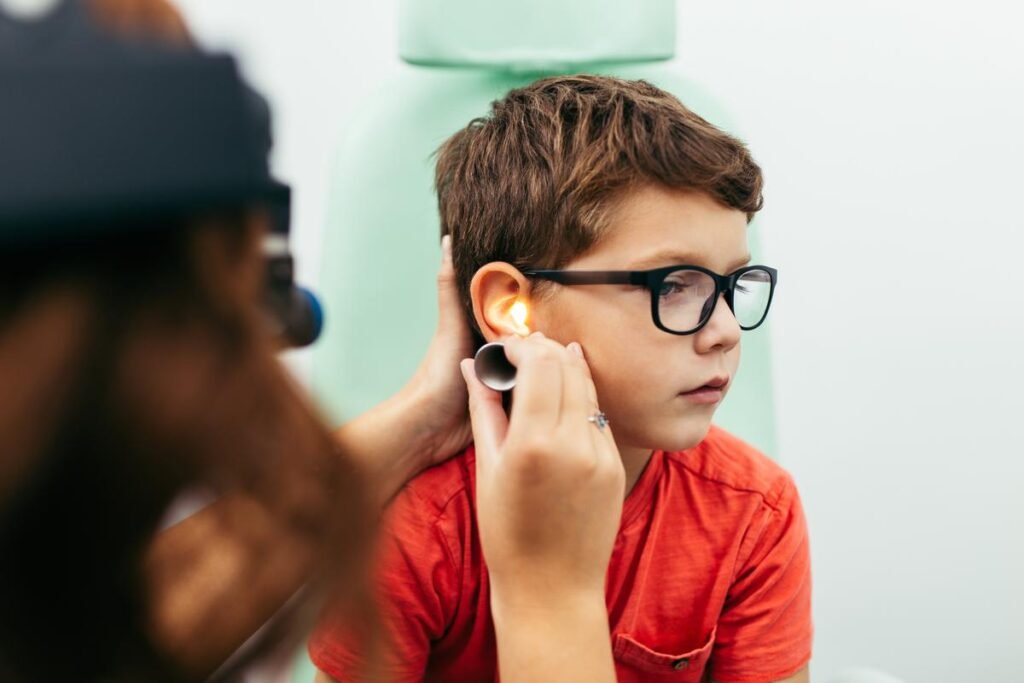Hearing Aids for Children
Is your child having a problem with hearing?
Ear Logist can provide you with the best solution.
Book a Free Hearing Aid Trial


We Served 2,00,000+ Customer Across India
Hearing Aids For Children

Importance of Hearing
Hearing is the key to your child’s development and learning. Nurture their potential by ensuring their hearing health. Some key reasons that highlight the importance of hearing in children:
- Language and Speech, Development: Hearing is essential for your child to develop language and speech skills. Through hearing, children learn to differentiate sounds, recognize words, and understand the variations of language. A child with proper hearing abilities can more effectively communicate, express themselves, and understand the world around them.
- Learning and Education: Hearing is directly linked to learning. In the classroom, children rely on their hearing to understand instructions, participate in discussions, and engage with educational materials. Hearing loss can significantly impact a child’s academic performance, making it challenging to keep up with lessons, follow along in class, and grasp important concepts.
- Social and Emotional Development: Hearing enables children to connect with others and form meaningful relationships. By being able to hear and respond to conversations, children can engage in social interactions, develop friendships, and experience a sense of belonging. Hearing loss can often lead to feelings of isolation, frustration, and low self-esteem, affecting a child’s social and emotional well-being.
- Safety and Awareness: Hearing plays an important role in ensuring a child’s safety and awareness of their surroundings. By being able to hear sounds like sirens, alarms, or warnings, children can respond appropriately and avoid possible dangers. Additionally, hearing helps children stay attuned to their environment, allowing them to navigate their surroundings and react to potential hazards.
- Cognitive Development: Research suggests that hearing is closely linked to cognitive development in children. Hearing loss can disrupt a child’s cognitive abilities, including memory, attention, and problem-solving skills. By addressing hearing loss early and providing appropriate intervention, children can maximize their cognitive potential and overall intellectual development.
Hearing Loss in Children

- Hearing Loss in Children is a significant concern that can have a profound impact on their development and quality of life. It is estimated that around 1 to 3 out of every 1,000 children are born with Hearing Loss, and it can also develop during childhood due to various factors.
- Causes of Hearing Loss in Children can be inherited, resulting from genetic factors or maternal infections during pregnancy. Acquired hearing loss may occur due to infections, ototoxic medications, head injuries, or prolonged exposure to loud noise. Early detection and intervention are crucial in identifying and addressing hearing loss to ensure optimal development and quality of life for children.
- Timely detection allows for appropriate management strategies, such as Hearing Aid Machines, cochlear implants, or other assistive devices. These interventions aim to optimize communication, language development, and overall educational outcomes for children with hearing loss.
- Hearing loss in children can have far-reaching effects on their speech and language skills, academic performance, social interactions, and emotional well-being. It can hinder their ability to communicate effectively, participate in classroom activities, and form relationships with peers. Without proper intervention, children with hearing loss may experience delays in speech and language development, which can significantly impact their educational progress.
- Regular hearing screenings, especially during infancy and early childhood, are essential to identify any possible hearing issues. Additionally, creating a supportive and inclusive environment at home, school, and in the community is vital for children with hearing loss. This can include implementing assistive technologies, providing appropriate educational accommodations, and fostering a positive and understanding atmosphere.
- Collaboration between parents, healthcare professionals, educators, and specialists is key in managing hearing loss in children. Through comprehensive evaluations, individualized treatment plans, and ongoing support, children with hearing loss can reach their full potential and thrive in all aspects of their lives.
- It is important to raise awareness about the impact of Hearing Loss in Children and promote early intervention to ensure that every child has the opportunity to hear, communicate, and participate fully in the world around them.
Hearing Aids for Children

Hearing Aid Devices for children play a significant role in improving their ability to hear and communicate effectively. Ear Machines are specifically designed to meet the unique needs of children with hearing loss, taking into account their size, comfort, and lifestyle.
One of the primary goals of hearing aids for children is to provide optimal sound amplification, allowing them to access and understand speech and environmental sounds.
When it comes to choosing the Best Hearing Aids for Children, several factors need to be considered, such as their specific hearing needs, age, lifestyle, and comfort. Some popular options for children include Behind-The-Ear (BTE) Hearing Aids, Receiver-In-Canal (RIC) Hearing Aids, and In-The-Ear (ITE) Hearing Aids. These styles offer durability, flexibility, and improved sound quality, ensuring that children can actively participate in daily activities and communication with confidence.
Hearing aids for children often feature advanced technologies and features to enhance their listening experience. They may include noise reduction capabilities to reduce background noise, directional microphones to focus on sounds from specific directions, and feedback cancellation to minimize whistling or feedback sounds. Some models also offer wireless connectivity options, allowing children to stream audio directly to their hearing aids from compatible devices like smartphones, tablets, and televisions.
When fitting Hearing Machines for Children, audiologists work closely with parents to ensure proper programming and adjustments. Regular follow-up appointments are necessary to monitor the child’s progress and make any necessary modifications to the settings. It is essential to maintain a combined approach, involving the child, parents, audiologists, and educators, to ensure that the child’s hearing aids are optimized for their specific needs and environments.
It is important to recognize that hearing aids for children are not a “one-size-fits-all” solution. Each child’s hearing loss is unique, and their hearing aids should be tailored to their specific needs only.
Hearing Aid Devices for Children are not only technological devices but also tools that empower children with hearing loss to navigate the world around them. They enable them to develop crucial communication skills, build relationships, and thrive in educational and social environments. With the support of dedicated professionals and the use of appropriate hearing aids, children with hearing loss can overcome barriers, unlock their potential, and lead satisfied lives.
Frequently Asked Questions
What can Cause Hearing Loss in a Child?
Hearing Loss in Children can be caused by various factors, including genetic conditions, infections, certain medications, birth complications, exposure to loud noises, head trauma, and abnormalities in the ear structure.
How much do ear machines cost in India?
The cost of ear machines in India can vary widely depending on the type, brand, and features. It can range from as low as a few thousand rupees to several lakhs, depending on the sophistication and technology involved.
What to do if your child has hearing loss?
If your child has Hearing Loss, it is important to seek professional help from an audiologist or hearing healthcare specialist. They can evaluate your child’s hearing and recommend appropriate interventions, such as Hearing Aids, cochlear implants, or speech therapy. At Ear Logist, you can get the best consultancy for your child’s hearing loss.
Can hearing loss be recovered?
In most cases, hearing loss is permanent and cannot be fully recovered. However, with the help of hearing aid devices and other assistive devices, individuals with hearing loss can significantly improve their hearing and quality of life.
